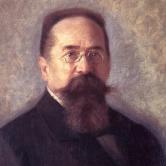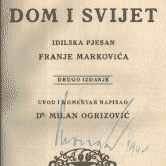Personage > Franjo Marković
"Franjo Marković attended elementary school in Križevci, and a Gymnasium in Zagreb. He studied classical languages, philosophy, and Slavic languages and literature in Vienna. In 1866 he became a substitute teacher in Osijek Gymnasium. Participating in political demonstration, he signed a petition against Banus Rauch, and was punished on the grounds of "indecent political behaviour". In 1868 he got transferred to Zagreb Gymnasium, only to be fired in 1870, when he goes to Vienna to study philosophy. There he attended Professor Zimmermann's aesthetical classes, and earned his Ph.D. in 1872. When he was only 27, he became, at first together with Ivan Dežman, and later alone, the editor of one of the most prominent literary magazines of the period, Vijenac (Laurel Wreath) (1872 - 1873). In 1874 he became a university professor at the Faculty of Philosophy in Zagreb. He was the first Dean of the Faculty in 1874/5, and a member of the Yugoslav Academy of Sciences and Arts. He was also a prominent politician and the MP for the town of Križevci. In 1910 he was retired, but he was still giving lectures at the Faculty. His views on aesthetics are based on Herbert's formalist aesthetics, established by Robert Zimmermann. He gave an outline of his views in "Razvoj i sustav obćenite estetike (Development and System of General Aesthetics". Franjo Marković was the first person to introduce philosophical terms in the Croatian language."In the idyllic epic Dom i svijet (Home and the World) Marković writes about his homeland:
Whoever lives in it, is the luckiest person alive,
The one who has to leave it is the saddest one,
But the one who works hard only to have his homeland crushed by enemies, is cursed.
"Epic Kohn and Vlasta describes fighting between Slavs and Germans at the Baltic. Tragedy Karlo Drački portrays a man who is killed in the fights against Rome and Hungarian nobility. "Benko Bot" is a drama exposing the conflict between sense of duty and human feelings. On October 18, 1875, he made a speech at the opening of a University "K logici (Towards Logics)", enticing people to turn to philosophy for enlightenment."Franjo Marković's literary works prove that he did fulfill the request of his friend August Šenoa, who, describing in a letter a great crisis which broke out after some of the prominent leaders in the national revival died, pleaded with Marković to keep writing as much as he could.
The idyllic epic Dom i svijet (Home and the World) is one of his best works. Born in the period of Croatian National Revival, Marković felt conflicts and tensions under absolutism growing in his homeland during his childhood. In his youth, he saw the Habsburg Monarchy being divided, and Croatia being subordinated to Hungary and its rule. It is exactly this last period, after 1848, that is described in Dom i svijet. It portrays a small, and narrow world of a Croatian feudal dominated by Hungarian rule, political intrigues. Marković vividly portrays the atmosphere and certain characters, like the old major Bunić, Austrian traitor Erger, parish ministers. The profound value and interest of the epic resides in its fragments, episodes, and details describing the idyllic countryside, in the romantic descriptions of the Drava River Basin region, smell of the freshly mowed grass, hunting, vintage, and the old Croatian national folk customs and tradition. Marković presents a lyrical vision of Croatian landscape and a compelling beauty of its nature. However, he doesn't convey the realistic situation in the local area, which will be conveyed only in the work of Krsto Hegedušić, since he sees the countryside as idyllic and compelling. Still, regardless of its standard Romantic characteristics, and idyllic motifs, accompanied with the feudal background, one can appreciate a great aesthetical value of this epic which conveys a resourceful activism in the face of political forces, and rises our emotions beyond the dark reality into the realm of art.




